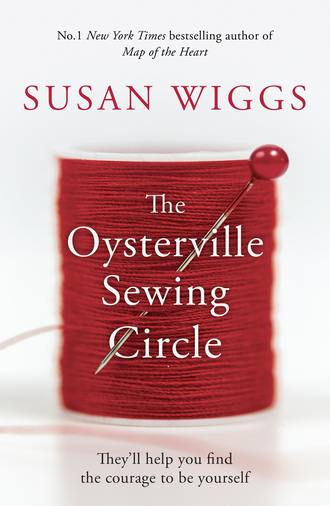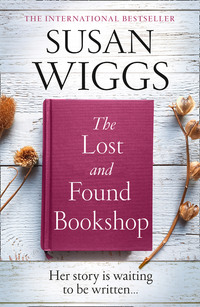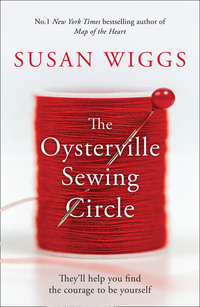
Полная версия
The Oysterville Sewing Circle
“Good plan. I bet you’re hungry,” she said. Dottie Shelby was the sort of person who saw others the way they wanted to be seen. She had a particular talent for finding the best in people, children and adults alike.
“We heard a rumor of pancakes,” Caroline said.
“You heard exactly right. Come on in and let’s eat. Dad will bring in your things. There’s so much to do and see, but you don’t have to do it all today,” Mom nattered on. “You both look like you love to run and jump. Are you into running and jumping?”
Flick and Addie exchanged a glance, and Flick offered a slight nod. Mom didn’t press but strode ahead with confidence.
The kids stuck close to Caroline as they all went inside. The old house welcomed her, as familiar as her mother’s embrace. The foyer was bright with a mirror reflecting the light from the outside and a hall tree made of driftwood.
Every house had a smell. This one was a particular mix of baking, salt air, and the dry, tumbly aroma from a constantly running clothes dryer. At least it used to run constantly when Caroline and her siblings were young. Now there was probably far less laundry cycling through, but the fluffy smell lingered still.
The living room was filled with an eclectic mix of furniture, family pictures, a few antiques, and Mom’s old upright piano.
“We all took lessons,” she said, noting Flick’s interest. “My brother Austin got really good at it.” She steered them to the hall bathroom and somehow managed to change Addie out of her pee-smelling clothes and into clean ones. Then she supervised the washing of hands, still somewhat befuddled by the idea of having to supervise anything of the sort. Just a short time ago, she was on her own, living in the heart of New York City’s fashion district.
There were artifacts everywhere—the pottery soap dish Jackson had brought home from preschool with his little handprint in the middle. Another family picture hung above the commode, this one of the older girls holding up a surfboard with Caroline and the boys seated on it. She still remembered the roars of laughter that had erupted as they’d struggled to stage the shot, getting dumped into the sand multiple times. She was eight or nine in the photo, wearing Virginia’s hand-me-down swimsuit, which she’d rescued from looking like a hand-me-down by sewing a rumba ruffle to the back.
“I’m off to work,” Dad called from the front hallway. “See you tonight, okay, C-Shell?”
“Sounds good,” she said.
Next stop was the kitchen. Contrary to what people expected of a longtime restaurant family, the kitchen was small and plain, with a four-burner range, a roomy fridge, and the all-important dishwasher. Mom always said a fancy kitchen was no substitute for good cooking.
“I’m Virginia,” said her sister, blowing them a floury kiss from her spot at the counter. “And you’re about to have the best pancakes of your life.”
Caroline gave them a nudge. “She’s bossy sometimes.”
“Not bossy,” Virginia said with a sniff. “I just have better ideas than most people.” She was the second eldest and most outgoing of the Shelbys. “I have a secret pancake recipe. But I tell it to everybody, so it’s not really a secret.” She pulled a couple of barstools over to the counter. “Have a seat, you two, and pay attention. You have to sift the dry ingredients together. See how the sifter works?” She demonstrated and gave them each a turn. “That makes everything nice and fluffy. And we use real buttermilk, not regular milk. It tastes kind of sour.” She offered them a sample on a small spoon, but the kids shrank together and shook their heads in silence.
Watching her sister’s ease with the children, Caroline felt a renewal of the doubts that had chased her across the country. Unlike Virginia and her mom, she didn’t “get” kids. She never had. She’d always been vocal about being childless by choice. Possibly that made her boy-friendless as well, but that was the price she paid for clinging to her freedom. Yet here she was with two kids in tow, and she had no idea what to do with them.
She thought for a moment about the expression on Will Jensen’s face when she’d told him, “They’re mine.”
And they were. Yet they weren’t.
“The eggs are from our own hens. See how yellow the yolks are?” Virginia broke two of them into a glass bowl and whisked them together with the buttermilk and a bit of melted butter. Then she combined everything to make the batter. “The biggest secret of all is this awesome cast-iron griddle. It’s a Griswold—they don’t even make them anymore. This one is as smooth as glass. I have it on the perfect temperature. Help me out here.”
She poured the batter and supervised as the kids dotted the pancakes with blueberries. A few minutes later, Caroline got the two of them situated on benches in the adjacent breakfast nook. Their eyes widened as she placed the first batch of pancakes on the table, bursting with berries and slathered in butter and warm maple syrup. The ultimate comfort food.
“Dig in, you two,” she said. “Let’s fill your bellies, and then I’ll show you where you’re going to be staying.” Over their heads, she checked with her mother, who offered a nod of encouragement.
The children devoured their breakfast with gratifying speed. Caroline helped herself to coffee and a pancake fresh off the griddle. It was so good it nearly brought tears to her eyes. “Thanks, Virginia. That was delicious. It’s been a long haul.”
“You’ve all had quite an adventure,” Mom said. “I want you to know, I’m so very sorry about your mother. You must miss her so much.”
“She died,” Addie said. “She’s not coming back.”
“It’s a terrible thing. I wish we could help. All we can do is love you and keep you safe and help you remember your mom. If you feel sad and want to tell us about it, we can listen.”
Caroline felt a surge of gratitude as she regarded her mother and sister. This was hardly the path she’d expected to find herself on, but here she was, in charge of two orphans, far from the life she’d been living in New York. Everything had changed in a split second—unforeseen, sending her scrambling. If she hadn’t had this family to fall back on, she couldn’t imagine what she would have done.
When they finished breakfast, her mother said, “Let’s clear the table together, and then I’ll take you to see your room.”
Flick surveyed the table, his brow slightly quirked. Angelique had been an unconventional mother in many ways, and traditional chores had not been a thing with her.
“Let’s take our dishes to the sink,” Caroline said. “Then we’ll wipe the table.” Falling back into a family routine was easy for her, but she could tell the kids would need time to adjust.
They made short work of clearing up and then trooped upstairs, passing more family pictures on the landing. The room her mother had prepared for Flick and Addie was the one Caroline had once shared with Virginia. Georgia, the eldest, had the privilege of a room of her own, and she used to lord it over the others like an anointed queen. The boys shared another. All five of them had fought like littermates over the bathroom.
Her mother stood with the door held wide open. “I dug out a few choice toys from the old days,” she said. “I hope you like Legos and stuffed animals. And books with actual pages that turn.”
The children regarded the room with wide eyes. Compared to the walk-up in Hell’s Kitchen, and later the apartment they’d shared with Caroline and their mother, the bedroom probably seemed as big as an airplane hangar.
A couple of old National Geographic maps still hung on the wall of her old room. The colors had faded and the dry paper was curled at the edges. She saw Addie studying them. “This is the United States,” Caroline said. “Our whole big country. Here’s New York, where we left last week. And we drove all the way here.” She traced the route with her finger, pointing to the spot where Oysterville would be, were it significant enough to appear on the map.
“That was a super-long drive,” Mom said. “I hope you two will be comfortable here.”
Addie made a tentative study of the toys and books Caroline’s mom had thoughtfully displayed. And Dottie’s thoughtfulness didn’t end with toys and books. She’d saved some of Caroline’s early and most painstaking work. “Caroline made the coverlets and curtains all by herself when she was only twelve years old. She was always so good at making things. Do you like making things?” she asked the kids.
Flick offered a lost little shrug of his shoulders, then studied the floor.
The coverlets were known as crazy quilts. According to Lindy at the quilt shop, Caroline had taken crazy to a whole new level. The pieces were not even standard in shape, but free-form bursts of color stitched together and embroidered with whimsical designs. Now she ran her hand over the cloth, thinking about that girl who’d been so obsessed with art and design. There was never a time when she wasn’t designing something. She’d felt so caged in here, knowing there was so much to experience and learn in the big wide world. Even after years in New York, she doubted that her family understood her hunger and need to be in the middle of everything in the hub of the design world.
Coming home felt like an embrace of safety.
Coming home felt like defeat.
Coming home was the last resort.
The sentiment was a sunken, hollowed-out spot inside her. Caroline realized it was wrong to let herself wallow this way. A better person would turn it into determination. But at the moment, as she drowned in exhaustion, it was the only possible way to feel.
Addie dragged Wonder Woman to the dormer window between the two beds and gazed outside. A thick wisteria vine twisted down the side of the house, its purple blossoms nodding in the breeze. The yard below had fruit trees, gnarled with age, and a fire pit they used to sit around on clear evenings, toasting marshmallows and telling stories. Farther in the distance, past the dunes, was the flat sandy beach.
Caroline hunkered down beside the little girl. “Virginia and I used to stand here together on summer nights, watching people on the beach. You’ll see—in the summer, it stays light ridiculously late, way past nine o’clock. So when we’d see kids still out playing on the beach, I thought it was totally unfair. It didn’t seem right that Virginia and I had to go to bed while the rest of the world was out playing.”
“And yet you survived,” said her mother.
“True,” Caroline agreed, straightening up. When she was older, the wisteria vine had been her secret escape route. She thought it best not to mention that.
“You’re looking at the Pacific Ocean,” she told the kids. “It’s the biggest ocean in the world. Let’s have a rest, and later we’ll go check it out.”
“I don’t feel like resting,” said Flick.
She felt like sleeping for a week. Not an option with two kids needing her. “Tell you what. Let’s go to the beach and explore. And there’s even more good news.”
That always got their attention.
“No car ride today.”
“Yay!”
“After all that driving, we need a little hike to stretch our legs.” They trundled downstairs, and as they headed for the door, she turned to Virginia. “Thanks again for breakfast.”
“You betcha.” Virginia wiped down the counter. “I have questions.”
“You betcha,” Caroline echoed.
“Drinks tonight, after the little ones are in bed.”
“You got it.” Drinks and talking would be a good place to start. She led the children outside. The air was fresh and damp, smelling of the ocean and new growth. “You can play anywhere you want in the backyard,” she told them. “Stay in bounds unless there’s an adult with you.” She walked with them through the orchard, showing them the berry frames and gardens, which were just getting started for the season. There was a chicken coop surrounded by wire fencing.
“Do chickens bite?” Addie asked, eyeing the birds.
“No, stupid, they don’t have teeth,” sneered Flick.
“Hey,” Caroline said, hoping to fend off a squabble. “We talked about this. Even when you’re tired and cranky, you can find a way to speak nicely to people. Or if not, you can zip your lips.”
“Sorry,” he muttered.
Caroline ruffled his hair. “Chickens don’t bite,” she said. “Sometimes they try to peck.”
“Does it hurt?”
“You can’t let them get away with it,” Caroline said. “When I was little and it was my turn to gather eggs, I used to take a dish towel with me.” She pantomimed with her hand. “I’d flap it like this, and they’d all go running away. I’ll show you later how it’s done.”
Flick stopped to look at an acacia tree with a carved stone at the base. “That sign says Wendell.”
Caroline felt a bittersweet wave of emotion. “That’s right, Wendell,” she said. “He was our dog. We were all really sad when he died, so Grandpa Lyle’s friend Wayne made a special stone with his name on it.”
“Will Mama have a stone?”
She should have expected that. Though the children didn’t know it, Angelique’s remains had made the cross-country journey with them. The plain sealed container was stowed with the car’s spare tire, and she had no idea what to do with it.
“Would you like one?” she asked.
Another shrug. His code for being at a loss. She rested her palm between his shoulder blades. He was so little and delicate. She’d been dwelling on the disaster her life had become, yet her troubles were nothing compared to the trauma these kids were going through. “You can let me know. There’s no hurry.”
A flicker of movement caught her eye. “Hey, check it out. There’s a little creature living in the dunes. Be really still and watch. It’s called a vole. See where it lives? It’s like a little bird’s nest.”
They watched the tiny creature foraging in the grass.
“Can we pet it?”
“It’s a wild animal. We can watch, but not touch, okay?”
“Looks like a mouse,” Flick said.
The children had never known anything but the city. Their experience with wildlife was limited to messy pigeons and rats sneaking around the Dumpsters of the back alleys.
“This is going to be a whole new world for you,” she said, watching their fascination as they squatted amid the buff-colored grasses and new green shoots to watch the vole, industriously padding its nest with bits of dried leaves and fluff. “So many birds and little creatures everywhere.”
After a while, she led the way to the beach. It was the playground of her youth. There was never a time when she hadn’t awakened to the muffled roar of the ocean and the deep, fecund aroma of salt air.
One of Caroline’s earliest memories was of being lost amid the fore-dunes and hummocks when the grass was taller than she was. There had been a moment of disorientation, her heart jolting in panic. Then she recalled her father’s advice. Don’t walk in circles. Walk in a straight line. At least you’ll end up somewhere.
Escaping from the tangled grasses, she’d found her family in the yard, probably gathered around the stone-built fire pit, or playing Frisbee with the dog. No one had remarked upon her absence. No one had come looking. From that early memory emerged a notion that had stuck with her ever since: as the middle child of five, she’d been invisible since birth.
Ultimately, her position in the birth order had actually worked out well for her. She was not as organized as Georgia and not as beautiful as Virginia. While everyone else was busy with the restaurant, Caroline was able to go her own way. She discovered that she actually liked disappearing. She often ended up at Lindy’s fabric shop or the fiber arts and design center at the high school, pursuing the mad passion no one else in her family seemed to understand.
Now the children ran along the path, which ended abruptly at the edge of the vast sand flats.
“Watch your step going down,” Caroline called. “It’s a steep—Jesus.”
Flick disappeared as though falling into a hole. Caroline broke into a run, reaching the edge of the escarpment and feeling the soft sandy bank collapsing underfoot. Flick lay at the bottom of the bank, half buried in sand, looking up at her.
“Hey,” she said. “Are you all right?”
“Yes.”
“You could have hurt yourself.” She took Addie’s hand and eased her down the bank amid a fall of loose sand.
“It was fun,” Flick said, jumping up and brushing himself off. He looked around with wide-eyed wonder. The scenery here was ever-changing, yet changeless—the sand sculpted by wind and tide, the wrack line woven with kelp and shells, feathers and bones, small pieces of driftwood, and an unfortunate variety of litter.
Flocks of ghost-colored sanderlings rushed in a panic at the edge of the waves. Sandpipers probed the estuaries, and gulls chattered and swooped.
“It’s so big,” Addie whispered, regarding the scene with wide eyes.
“Isn’t it?” Caroline plunked down onto the ground. “Take your shoes off. The sand feels wonderful. Have you ever been to a beach before?”
“Mama said she’d take us to Coney Island,” said Flick. “She never did, though.”
Caroline tried not to think about all the things they’d never get to do with their mother. “Well, you’re here now.” She jumped up. “I can’t be at the beach and not do a cartwheel,” she declared. “It’s completely impossible. No matter what sort of mood I’m in, I have to do a cartwheel. There’s something about these wide open spaces I can’t resist.”
With that, she spread her arms and executed a less-than-perfect cartwheel. “How’s that?”
“I want to try!” Addie leaped into a crouch.
“That wasn’t a cartwheel,” Flick said.
“It takes practice. Pay attention now.” Caroline drew a line in the sand with a stick. “You have to start in a lunge. It’s like a warrior pose in yoga.” She knew they practiced yoga at their school. “Put both hands down on the line and kick your feet over your head.” She showed them another cartwheel. “And then you land in a lunge on the same line. Voilà!”
The kids made several attempts, and she helped them along. “Not bad for a couple of newbies. You’ll have lots of time to practice. You know what else is fun? Running!” She took off, watching them over her shoulder. They eagerly followed and were soon running along the broad emptiness. They rushed toward a flock of birds and watched them burst into the sky in one huge motion. She led the way into the surf, letting the waves chase them, and they squealed as the cold water surged around their bare feet. For a few moments, they were just a couple of kids, and the sight of them running along the beach gave her a momentary sense of joy—and maybe hope.
Yet the feeling was tinged with sadness and uncertainty. She still had no answer to the question that had dogged her across the continent—now what?
After a while, she found a driftwood log, battered smooth by time and tide, with a twist that formed a natural bench. “Come here, you two, and have a seat.” She tunneled her bare feet into the cool sand, finding a sand dollar and a broken nautilus shell. She made a simple mound. “In the summer, there are sand-sculpting contests. One year my family made a dragon as long as a truck.”
Flick shaded his eyes and tilted his face toward the sky. “Is this where we live now?”
Oh, boy. Don’t lie. “This is where we live for now. You have a nice room, and on Monday we’ll get you enrolled in school. So yes. We live here now. I hope you’re going to like it. It’s where I lived my whole life when I was a kid.”
“Did you like it?”
She looped her arms around her drawn-up knees. Don’t lie. “I did,” she said. “Once upon a time.”
“Then why did you leave?”
“Oh, so many reasons. I wanted to explore the world,” she said. “I went to New York to be a designer, but I always remembered this place, and even now, when I create something, there’s a little bit of this beach in the design.” She traced her finger around the whorls of the nautilus shell. “This is my favorite shape, in fact.” She winced as she said it, because the motif had been tainted by the fiasco in New York that had ended her career.
A few fat raindrops spattered down on them. “Welcome to the Pacific Northwest,” she said. “It rains a lot around here.” She tucked the shell into her pocket. “Guess that’s our signal to go inside,” she said, tipping her face to the sky. “You’re going to need raingear and some gum boots.”
Somehow she muddled through the rest of the day. At bedtime, the kids were clingy, which was understandable. They were two little strangers in a world that probably felt to them like another planet.
Angelique had never been consistent about bedtime. Sometimes there would be a bath and a story. Other times the kids would doze off on the sofa and their mother would carry them to bed. The counselor had advised Caroline that they would do better with a regular bedtime routine. Even while on the road, she’d tried to stick to that. No matter where they were, she would start the process at seven.
A couple of nights during their trip, Caroline had felt like she was about to melt from exhaustion, but she’d forced herself to go through the routine in whatever motel or roadside inn they’d stopped at for the night.
On their first evening in Oysterville, she followed protocol. “Okay,” she said, pointing to the kitchen clock. “What’s that say?”
Flick eyed the clock, one of those silly cats with the pendulum tail. “Seven o’clock.”
“Wow, telling time already,” said Caroline’s mother. “Impressive.”
“He’s super smart. So is Addie. What happens at seven o’clock?”
“Bath, bed, story, song,” Addie said.
“We’ve been practicing every night,” said Caroline. “We’re getting pretty good at it, aren’t we, guys?”
“I want to stay up,” Flick said.
“I’ll bet you do. But kids go to bed at seven. No exceptions.” She was learning that they would always try to push. “Tonight there’s one more seven o’clock job. You have to tell everyone good night.”
They made the rounds, hesitant and dubious. Strangers in a strange land. They said good night to her parents, and to Virginia, who had moved to the apartment over the garage after her divorce.
Then they followed her up the stairs for a bath to scrub off the sand from the beach. “Can Dottie help you with your bath?”
Addie nodded. Flick thought for a moment. Then he said, “We have trust issues.”
Caroline ruffled his hair. “Smarty-pants.” She looked at her mother. “We’ve been meeting on Skype with a child psychologist. Flick and Addie are learning ways to talk about their feelings.”
“I see.” Mom went down to Flick’s level again and looked him in the eye. “I realize you just met me, and you must have lots of feelings about the changes happening so fast in your life. It’s amazing that you came all the way across the country to be here. I hope pretty soon I’ll earn your trust.”
Caroline’s mom filled the tub and stepped away, watching from the doorway. There were questions during the bath.
“Why did we come here?”
Caroline soaped them up and gently washed their sweet, small bodies. “Because we couldn’t stay at our place in New York anymore.” Not after what went down there.
“We could get another place near my school,” Flick pointed out.
“I couldn’t afford it,” Caroline admitted, tasting defeat, a bitter flavor on her tongue.
“On account of you got fired from your job.”
“Pretty much.” She saw her mother studying her and looked away, busying herself with the children. Fired. It happened all the time in her industry. Egos ran rampant, tempers boiled over, people stabbed one another in the back, designers were blackballed. Caroline had never believed it would happen to her, though. The job had been everything to her. It had defined her, and when it all unraveled, the sense of loss and despair had left her reeling. She wasn’t just grossly unfit to raise two orphans. She was grossly unfit to do anything but flee to safety. What would define her now? Failure? Despair?
“You were getting money by fixing up clothes for people,” Flick continued.









